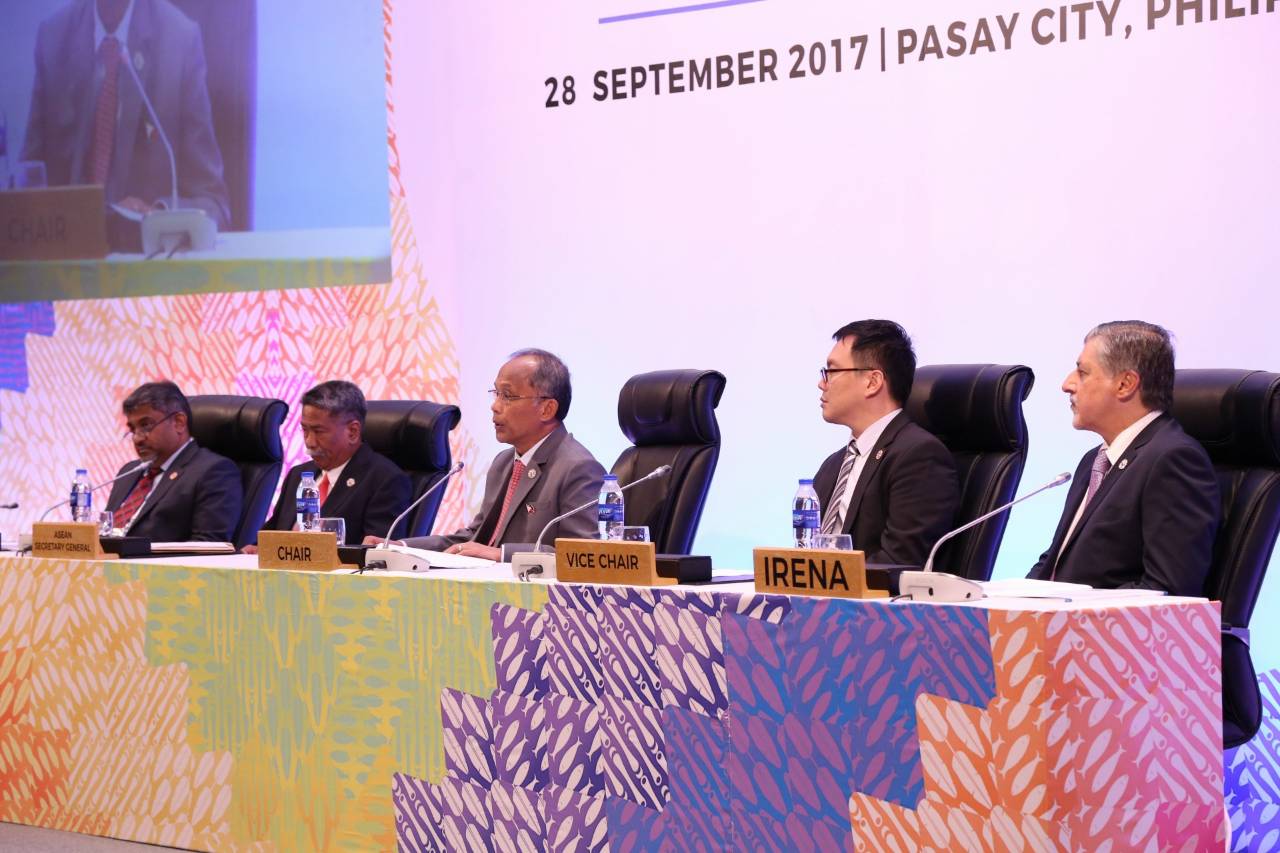
AMEM REPORTS: Secretary Alfonso G. Cusi and delegates meet the press in concluding the 35th ASEAN Ministers Energy Meeting and Associated Meetings (AMEM35) at the Conrad Manila. In photo along with AMEM35 Chair and Philippine Department of Energy Secretary Alfonso G. Cusi (center) are (L-R) ASEAN Center for Energy Executive Director Dr. Sanjayan Velautham, ASEAN Secretariat Deputy Secretary General of ASEAN Community and Corporate Affairs AKP Mochtan PhD, AMEM35 Vice Chair and Singapore Ministry of Trade and Industry S. Iswaran, and International Renewable Energy Agency Director General Adnan Amin.
(Manila, Philippines). ASEAN Member States (AMS) together with the ASEAN Secretariat, development partners and stakeholders have agreed on various energy cooperation projects to propel regional economic progress.
At the conclusion of the ASEAN Ministers on Energy Meeting (AMEM35), the Philippines' Department of Energy (DOE) Secretary Alfonso G. Cusi pointed out that the agreements on enhanced cooperation are intended to achieve a “One ASEAN Community Through Resilient and Sustainable Energy.”
The series of AMEM35 meetings included the 14th ASEAN+3 (China, Japan and Korea) Ministers on Energy Meeting; the First AMEM-International Renewable Energy Agency (IRENA) Dialogue; the ASEAN Energy Business Forum (AEBF); and the 11th East Asia Summit-Energy Ministers Meeting or the AMEM+8 (Australia, China, India, Japan, Republic of Korea, New Zealand, Russian Federation and the US).
Regional Energy Policy and Planning
The AMS, development partners and affiliate international organizations discussed the outlook for global and ASEAN energy and member states’ support for the implementation of the ASEAN Plan of Action for Energy Cooperation (APAEC) 2016-2025.
They agreed on the need for sustained cooperation to ensure security of energy supply and promote a low-carbon energy sector.
The AMS also gave due recognition to best practices and developments in the energy industry through the ASEAN Energy Awards.
Renewable Energy
The AMS agreed to boost efforts to attain ASEAN’s aspirational target of 23% Renewable Energy (RE) share in the region-wide energy mix by 2025.
The Ministers were also united in forging sustainable renewable energy cooperation together with the active participation of IRENA.
"We have a long way to go, so we have devised a Renewable Energy Outlook as guide to narrow the gap on the RE initiatives in the region,” Cusi said.
Trans-ASEAN Gas Pipeline (TAGP)
The AMS agreed to ensure accessibility and security of oil and gas supply in the region, through their continuing efforts on the intra-ASEAN Liquefied Natural Gas (LNG) Cooperation initiated by the ASEAN Council on Petroleum (ASCOPE).
The participants also stressed the pivotal role of natural gas to the region’s sustainable growth and the need to implement the long-term goal of open access to gas markets in the region; identify commercial opportunities; share best practices; and enhance policy development.
Clean Coal Technology
The AMS acknowledged the importance of promoting highly efficient and clean coal technologies in the regional drive to lower carbon emissions and a more sustainable future for the region and the world. At present, coal continues to be a major fuel source in the region.
Energy Efficiency and Conservation
The AMS agreed to work towards achieving by 2020 the ASEAN’s energy intensity reduction target by 20% based on 2005 levels. Currently, the ASEAN is at 18.3% level.
The Energy Ministers emphasized the need to foster innovative solutions and encourage countries to continue information sharing, best practices, capacity building, better business models and other alternative and emerging efficient energy technologies.
Civilian Nuclear Energy
The AMS discussed how to enhance the Member States’ capabilities on civilian nuclear energy for its safe and efficient development. The AMS invited development partners who are experts in the field, including Canada, China, Japan, Russia and the United States, to share their experiences.
ASEAN Power Grid
The AMS has already embarked on multilateral electricity trade in the ASEAN Power Grid through the signing of the Phase 1 of the Energy Purchase and Wheeling Agreement among Lao PDR, Thailand and Malaysia under the Lao PDR-Thailand-Malaysia-Singapore Power Integration Project (LTMS-PIP).
ASEAN Energy Investment
The AMS agreed to target an increase in the average GDP growth to 6% across the region, and recognized the vital role of the private sector and their active participation in the ASEAN region. The AMEM35 and the ASEAN Energy Business Forum had a joint opening ceremony to underscore the fact that the ASEAN is a sweet spot for business growth and development.
Finally, Cusi said: “The Philippines takes pride in hosting the AMEM35 as this showcases not only our capability to manage an international energy event, but the beauty and culture of the country as well the talents and hospitality of Filipinos.”
###
